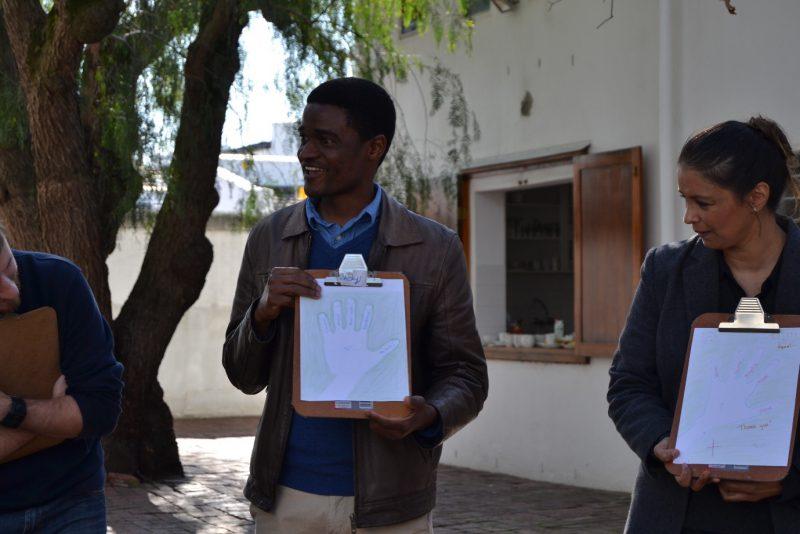Participatory Visual Methods for Research Engagement
AfOx Travel Grant recipient Gill Black’s successful ‘Bucket Loads of Health’ project in South Africa.

The concept of participatory research is becoming increasingly popular with researchers and scientists all over the world. Participation involves a process of carrying out mutually beneficial research with people rather than doing extractive research on them.
Participatory research responds to the fact that community members possess extensive and valuable local knowledge that can be hard to reach through the use of conventional research methods. Through in-depth and interactive engagement with community members, participatory research aims to surface this knowledge and give community members a platform to discuss their experiences and challenges, and to co-create solutions regarding:
- What needs to be changed
- Where change needs to take place
- How change can be achieved
- Who should be involved in making it happen
Dr Gill Black is a keen proponent and practitioner of participatory research and community engagement, and is especially interested in working with participatory visual methods (PVM). She is a co-director of the Sustainable Livelihoods Foundation (SLF). Gill has worked with a wide range of visual methods including digital storytelling, applied theatre, participatory photography and collective filmmaking. She has also been developing novel approaches to hand-mapping and body-mapping for the purposes of community engagement.
Gill was recently awarded an AfOx travel grant and visited the Ethox Centre at the University of Oxford for 3 weeks in March 2019. During her visit, Gill gave a seminar about ‘Bucket Loads of Health’ a public engagement project that focused on water shortage and water research. In 2018, the Western Cape (WC) of South Africa experienced its worst drought in a hundred years, which led to the implementation of high-level water restrictions in multiple areas of the province.
The ‘Bucket Loads of Health’ project engaged with residents of Enkanini and Delft, two WC communities that were being severely affected by water scarcity. The engagement process involved bringing these community members together with a team of water microbiologists that do research on harvested rain water in Enkanini. Their research seeks to identify alternative, safe and sustainable sources of water for informal settlements. Gill presented ‘Bucket Loads of Health’ as a case study to demonstrate how the participatory visual methods of hand-mapping and body-mapping can be used to enable powerful and productive engagement between scientists and community members. She explained how each of the scientists had created a personalized hand map to illustrate her or his main reasons for becoming a water microbiologist, and to describe their ambitions and concerns about their research. The scientists had used these hand maps as a way of introducing themselves to the community participants which had helped to instil a sense of trust and confidence in the engagement process.
Through their individual body-maps, the Delft participants expressed the multiple and far-reaching ways in which individuals, families and neighbourhoods had been negatively affected by extreme, enforced water restrictions during the 2018 drought. The Enkanini group used their body-maps to tell personal stories that communicated their experiences of living with the constant water shortages that come with living in an informal settlement. These stories clearly conveyed how the safe and hygienic disposal of waste-water and sewage was an even higher priority for them than the increased provision of clean running water. By working with Gill and her colleagues from SLF, the Enkanini participants produced a collective film that they called ‘Our Water Challenges’. This film underlines the health impacts of unsanitary waste-water disposal, and highlights the steps that the Enkanini group think should to be taken to improve the situation. A body-map created by Vuyokazi, a woman who lives in the informal settlement of Enkanini.
During the seminar Gill shared the film ‘Doing It Differently: Public Engagement in Science’ which was produced by the SLF team to show the novel, creative approach they had taken to the project. Gill also shared some key insights about what had helped to make the project successful:
- ‘Bucket Loads of Health’ provides an example of how the health-related priorities of a community can be off the radar of scientists who don’t live or spend much time in those settings.
- Working with participatory visual methods enabled residents of two distinct and disadvantaged communities to articulate their experiences of water shortage and their perceptions of research, and to interact confidently with the scientists about these issues.
- By participating in a hand-mapping exercise, the research team presented themselves as approachable people who are emotionally connected to their work and who are interested to learn from those who live in the community where they work.
- By engaging with an array of visual materials that had been created by community members, a team of researchers were able to see the topic of their science in a new light and from a more grounded perspective.
- The project approach allowed ‘Bucket Loads of Health’ to take on a life of its own, leading to community mobilization, advocacy and activism related to water disposal and water provision.
Following the seminar, Gill led a discussion on best approaches towards participatory research and engagement that included points about planning, budgeting and following up with community members after the completion of a project.
The AfOx Travel Grant made it possible for Gill to strengthen a collaboration between SLF and researchers at the Ethox Centre in Oxford. Through this collaboration she plans to explore the implications and longer terms outcomes of public engagement in health research. Gill is particularly interested in the potential for participatory public engagement to shift the way that scientists think about their research and to understand more about the ethical dynamics of public engagement from the perspectives of all those who become involved. To learn more about SLF and Gill’s work visit : http://livelihoods.org.za
